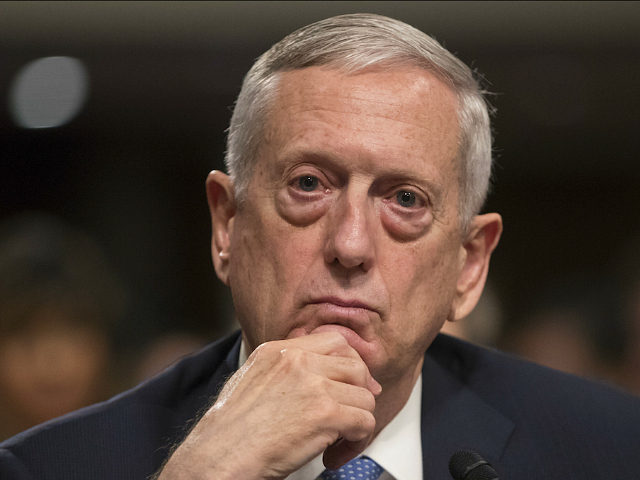China’s state-run Global Times lectured U.S. Secretary of Defense Jim Mattis to keep his mouth shut and ears open during his first official visit to China this week, riffing on Mattis’s own modest comment that he flew to Beijing for a “conversation.”
The Global Times hits China’s usual talking points: the Trump administration launched an unfair trade war against us, we have nothing but good intentions in the South China Sea, we are all about global peace and prosperity, and bitter old America is trying to kneecap our much-deserved rise to superpower status.
There is a passage where China — the nation that uses “sharp power” to intimidate foreign companies into obeying its speech codes no matter what their home constitutions say about free speech — whines about America’s superior ability to influence world opinion:
Both sides should learn to be good listeners. The US is adept at expressing itself and capable of making its voice loud enough to influence international public opinion. China lags far behind the US in this regard. Thus, Washington should try to understand Beijing’s perspective by standing in Beijing’s shoes rather than turning the dialogue into a chance to intimidate China.
The key point of the Global Times’ lecture to Mattis is a demand for the defense secretary, and the rest of the Trump administration, to recognize Beijing’s boundless good intentions and stop warning smaller nations about Chinese militarization and debt imperialism:
The South China Sea is a gateway to China and an intersection of international naval passages. The US has been playing an active role in the region amid territorial disputes. This has posed comprehensive challenges to China. China’s construction on Nansha Islands is a decision made after taking into consideration the need to safeguard the country’s sovereignty and regional peace. China hasn’t recaptured any islands occupied by other countries, or deployed offensive operations in the region. Beijing has been exercising restraint in the face of provocation.
It is strategic discrimination against China for the US not to accept China’s construction works in the South China Sea. The US has hundreds of military bases all over the world, but is unwilling to see China’s enhanced military projection capability. This is hegemonic mentality and is not constructive in managing major-power relations.
If the US fails to understand China’s sense of insecurity, or misinterprets the necessity of the actions that China has taken to alleviate this sense of insecurity, tensions will be inevitable in Sino-US ties. We hope Mattis can take advantage of this visit to seek maximum common ground with China.
A spokesperson for the Defense Ministry told the Global Times Mattis would visit China from Tuesday to Thursday at the invitation of Defense Minister General Wei Fenghe. One item on the agenda is resuming construction of U.S.-China military hotlines that were put on hold after China was disinvited from the Rim of the Pacific (RIMPAC) exercise in May.
The second Global Times piece sent more signals to Mattis that he will not get anywhere by criticizing China’s militarization of the South China Sea, and, in fact, China regards such complaints as “provocative”:
“Mattis may also express US concerns on South China Sea issues and might ask China to reduce or slow island constructions in the region. But the South China Sea is China’s territory and the US must stop its provocations,” [Beijing-based military expert] Wang [Yunfei] remarked.
Mattis criticized China on South China Sea issues when he attended the Shangri-La dialogue held in Singapore on June 2, Reuters reported.
The Taiwan question may also be a key topic for Mattis, especially after the US Congress passed the “National Defense Authorization Act,” which authorized the US to conduct high-level personnel exchanges with Taiwan and to potentially send its warships to visit the island, Wang said.
Mattis was greeted with a floral bouquet when he landed in Beijing on Tuesday. The South China Post expect that contrary to Mattis’s polite offer of constructive conversations, he and his Chinese hosts are more likely to “clarify and reiterate their positions” instead of making major progress:
“I think the possible outcomes, if there are any, will be on a working level – such as plans to continue the exchanges,” according to Wu Xinbo, an American studies expert at Fudan University.
“I wouldn’t rule out Mattis being given some type of subtle demonstration of Chinese muscle, since goodwill gestures won’t be much help,” he said.
Fu Mengzi of the China Institutes of Contemporary International Relations said that despite all of China’s assertions concerning the South China Sea and its criticism of American freedom of navigation patrols there, Beijing’s more immediate concern is Taiwan:
“Recent pro-Taiwan bills [such as the National Defence Authorisation Act passed by the US Senate] authorised the military to cooperate with Taiwan in ways that could overturn the foundation of US-China relations,” Fu said. “Beijing will want to make this point very clearly to Mattis.”
The Pentagon is also reportedly considering sending warships through the Taiwan Strait and increasing arms sales to Taiwan because of Beijing’s stepped-up military activity around the self-ruled island – which Beijing sees as a renegade province subject to reunification, by force if necessary.
Mattis is likely to bring up China’s recent naval exercises near Taiwan, and perhaps suggest China’s behavior will have some bearing on which weapons Washington is willing to sell to Taipei.

COMMENTS
Please let us know if you're having issues with commenting.